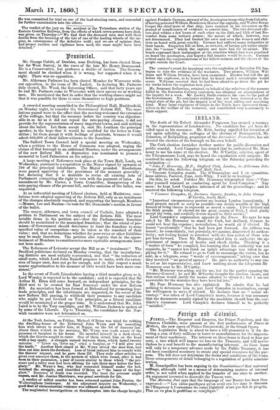IRELAND.
The death of Sir Robert Alexander Fergusson has created a vacancy in the representation of Londonderry. No candidate has yet been de- cided upon as his successor. Mr. Kerr, having signified his intention of not again soliciting the suffrages of the electors of Downpatrick, Mr. Johnston, of Ballykilbeg, proprietor of the Downshire Protestant, has ad- dressed the electors of the borough on his own behalf.
The Cork election furnishes further matter for public discussion and public scandal. Lord Campden has denied that he authorized Mr. Hen- nessy to use his name at the election. Mr. M'Carthy, solicitor, agent of the Mtramontane Lord, says he heard the repudiation with surprise. He received he says the following telegram on the Saturday preceding the nomination :—
"Joitti P. Hennessy, M.P., Stafford Club, London, to Alderman John George H`Carthy, Solicitor, South Mall, Cork.
" Viscount Campden stands. The O'Donoughue and I on committee. Issue address, Pastoral, Pope, Anti-Whig. I will be en hustings." On this, he acted. Further Mr. Hennessy telegraphed thus—" Con- sider yourself retained as conducting agent for Lord Campden." Nay more : he kept Lord Campden informed of all the proceedings ; and he received the following telegram.
" Viscount Campden, 41, Portman Square, London, to John George M'Carthy, South Hall. "Important circumstances prevent my leaving London immediately. I shall present myself as early as possible—am deeply sensible of the high honour of being chosen to represent so sacred a cause. I love Ireland and the Irish people. If elected for the great county of Cork, I shall gladly accept the trust, and cordially devote myself to their service." Lord Campden's explanation appears in the Times. He says he was asked by Mr. Hennessy to stand for Cork, but declined, because he could not bear the expense ; nevertheless, ho would sit if elected. He learnt "accidentally" that he had been put forward. An address was issued ; he immediately, but privately, we assume, disavowed its authen- ticity; not feeling bound to interfere with the free action of those who put him forward. Then Mr. Hennessy asked him to authorize the ap- pointment of inspectors of booths and check clerks. Thinking it 'a "matter of form" he complied, but learning that his authority was not requisite, he " cannot but think an unfair advantage was taken in ap- plying for it." He refused to go to Cork to encourage the voters, but he sent, in a telegram, some "words of encouragement," taking care that they involved " no proof of agency." He gave no authority to any one to act as his representative, and knew nothing about the telegrams Mr Hennessy _sent to Mr. M'Carthy. " Mr. Hennessy was acting, not for me, but for the parties opposing the Attorney-General ; he and Mr. M'Carthy thought the election secure, and that success would justify the means adopted to obtain it ; but I am not answerable for the mistakes they have been led into."
Mr. Pope Hennessy has also explained. He admits that he had
nothing to determine him to put Lord Campden in nomination, except his willingness to serve if elected. He declares that no " unfair ad- vantage" was taken of Lord Campden's name, because it was necessary that the documents usually signed by the candidate should bear the can- didate's signature. Lord Campden declares himself, to be perfectly " satisfied."


























 Previous page
Previous page